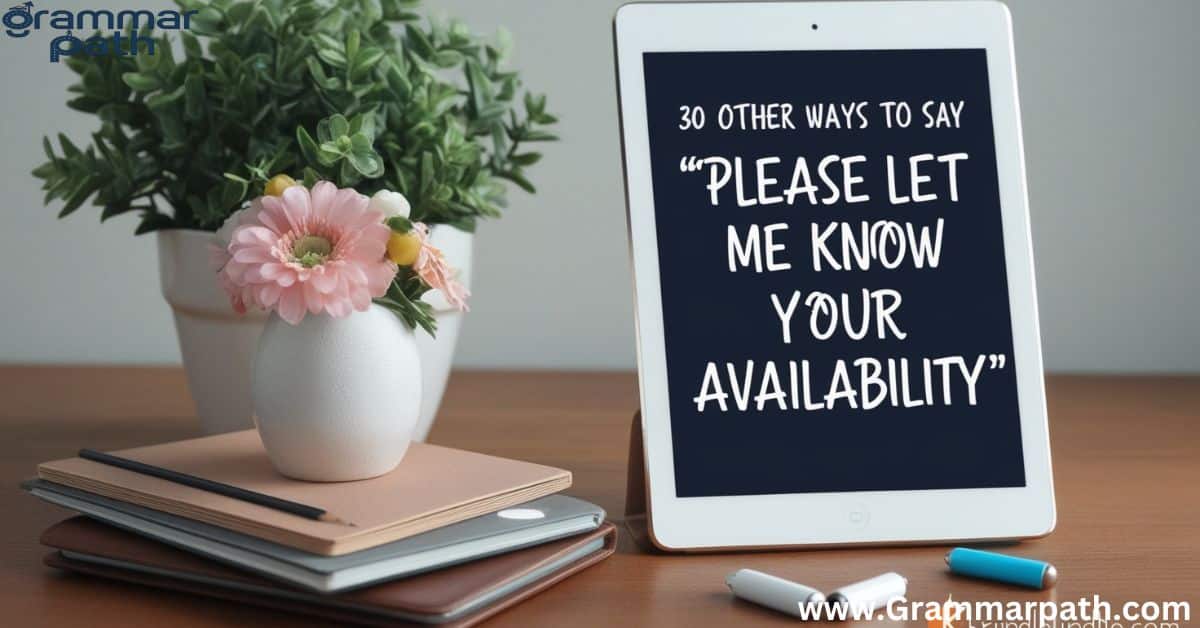
30 Other Ways to Say “Please Let Me Know Your Availability”
Availability inquiries have become an essential part of our daily communication, especially in professional settings. Whether you’re scheduling a meeting, planning a project, or simply trying to connect with someone, knowing how to ask about availability gracefully can make all the difference. This article will explore 30 alternative ways to say “Please let me know your availability,” providing you with a diverse set of phrases to suit various contexts and relationships.
Why does this matter? Well, the way we phrase our requests can significantly impact how they’re received. A well-crafted inquiry shows respect for the other person’s time and can lead to more efficient scheduling. It’s not just about being polite; it’s about effective communication that gets results.
In the following sections, we’ll dive into different approaches, from formal to casual, direct to considerate. You’ll find examples tailored to specific scenarios, helping you choose the perfect phrase for your situation. So, let’s embark on this journey to refine your communication skills and make your availability requests more impactful.
is it Professional to Say: “Please Let Me Know Your Availability”
Using the phrase “Please let me know your availability” in professional communication is generally acceptable and courteous. It shows respect for the recipient’s time and schedule while expressing a desire to meet or discuss something.
However, depending on the context and relationship, you might consider more specific alternatives like suggesting time slots or asking about preferences for particular days. The key is to be clear, polite, and mindful of the recipient’s position and your relationship with them.
What to Say Instead of “Please let me know your availability”:
- When works best for you?
- Could you share your schedule?
- What’s your ideal time frame?
- When are you free to meet?
- Which dates suit you?
- Can you provide some potential time slots?
- What does your calendar look like?
- When might you have an opening?
- Are there any convenient times for you?
- Could you suggest a few meeting options?
- When would be a good time to connect?
- What’s your availability like?
- Do you have any preferred meeting times?
- Can we find a mutually convenient time?
- When would you be able to fit this in?
- Could you indicate your free periods?
- What time windows work for you?
- When might you have some time to spare?
- Are there any gaps in your schedule?
- Could you propose a few timing options?
- When would be most convenient for you?
- What days/times are you typically available?
- Can you share your open time slots?
- When would you be able to pencil this in?
- Do you have any upcoming availability?
- Could you let me know your scheduling preferences?
- When might we be able to arrange this?
- What’s your typical availability like?
- Can you give me an idea of your free times?
- When would be a good moment for us to sync up?
Formal / Professional Context
In professional settings, it’s crucial to strike the right tone when inquiring about someone’s availability. These phrases maintain a level of formality while still being courteous and respectful.
1. “I’d appreciate your input on scheduling”
This approach acknowledges the recipient’s role in the scheduling process.
Example Email: Subject: Project Review Meeting – Scheduling Request
Dear Ms. Thompson,
I hope this email finds you well. We’re planning a project review meeting for next week, and I’d appreciate your input on scheduling. Could you please provide a few time slots that work best for you?
Thank you for your assistance.
Best regards, Alex Chen
2. “At your earliest convenience, please provide your availability”
This phrase conveys urgency while still maintaining politeness.
Example: In a professional Slack message:
Hi David, We need to discuss the Q4 marketing strategy. At your earliest convenience, please provide your availability for a 30-minute call this week. Thanks! Sarah

3. “I’d like to arrange a meeting at a time that suits your schedule”
This expression shows consideration for the recipient’s time constraints.
Example: In a LinkedIn message to a potential client:
Dear Mr. Roberts,
I’ve been following your company’s innovative work in sustainable energy. I’d like to arrange a meeting at a time that suits your schedule to discuss how our services might support your initiatives. Would you be open to sharing some convenient times for a brief call?
Looking forward to potentially connecting, Emma Lewis Green Tech Solutions
Casual / Informal Context
When communicating with colleagues you’re friendly with or in more relaxed work environments, these casual phrases can help maintain a laid-back approach while still getting the job done.
4. “When’s a good time to catch up?”
This informal question works well for scheduling casual meet-ups or quick discussions.
Example: In a text message to a coworker:
Hey Sam! When’s a good time to catch up about the Johnson account? I’ve got some ideas I want to run by you. Coffee break tomorrow, maybe?
5. “What does your calendar look like?”
This phrase is straightforward and friendly, perfect for colleagues you interact with regularly.
Example: In a team chat:
@TeamLead What does your calendar look like next week? Thinking we should have a brainstorming session for the new product launch. Anyone else want to join?
6. “Got any free slots coming up?”
This very casual approach is best used with close colleagues or in startups with a relaxed culture.
Example: In a quick hallway conversation:
“Hey Lisa, got any free slots coming up? I wanted to pick your brain about the UX design for our new app. No rush, but maybe we could grab lunch and chat?”

Direct / Straightforward
Sometimes, a more direct approach is necessary, especially when dealing with busy professionals or time-sensitive matters.
7. “Please indicate your availability for the upcoming week”
This clear directive helps streamline the scheduling process.
Example Email: Subject: Urgent: Team Performance Review
Dear Team,
We need to schedule individual performance reviews for next week. Please indicate your availability for the upcoming week by filling out the shared calendar link below. Each session will last approximately 30 minutes.
[Calendar Link]
If you have any conflicts, please let me know as soon as possible.
Regards, HR Manager
8. “I need your availability for a meeting on [specific date]”
When you have a specific date in mind, this phrase can help narrow down the options efficiently.
Example: In a project management tool comment:
@DevelopmentTeam I need your availability for a meeting on Tuesday, November 15th. We’ll be discussing the final changes before the product launch. Please respond with your preferred time slots between 9 AM and 5 PM EST.
9. “Let’s set a time. When works for you?”
This approach is direct yet open-ended, allowing the recipient to suggest times that work best for them.
Example: In a follow-up email after a networking event:
Hi Jordan,
It was great meeting you at the Tech Innovators Conference last week. I’d love to continue our discussion about AI in healthcare. Let’s set a time. When works for you for a 20-minute call in the next couple of weeks?
Looking forward to connecting again, Dr. Amelia Chang
Considerate / Polite
These phrases show extra consideration for the recipient’s schedule and preferences, which can be particularly effective when reaching out to superiors or clients.
10. “I’m happy to work around your schedule”
This expression demonstrates flexibility and respect for the other person’s time.
Example: In an email to a potential mentor:
Subject: Request for Career Advice Meeting
Dear Professor Williams,
I’ve long admired your work in environmental law and would be incredibly grateful for the opportunity to seek your advice on pursuing a career in this field. I’m happy to work around your schedule for a brief meeting, whether that’s a quick coffee or a short call.
Thank you for considering my request.
Sincerely, Taylor Martinez 3rd Year Law Student, State University
11. “Please let me know a time that’s convenient for you”
This polite request puts the ball in the recipient’s court, allowing them to choose a time that suits them best.
Example: In a client follow-up email:
Dear Ms. Patel,
Thank you for expressing interest in our consulting services. I’d love to discuss how we can tailor our offerings to meet your company’s specific needs. Please let me know a time that’s convenient for you for a 30-minute introductory call.
I’m generally available Monday through Thursday, 9 AM to 5 PM EST, but I’m flexible to accommodate your schedule.
Best regards, Michael Thompson Senior Consultant, Business Solutions Inc.
12. “I’d be grateful if you could share your preferred meeting times”
This phrase combines gratitude with a polite request, which can be particularly effective in formal or hierarchical situations.
Example: In an interdepartmental email:
Subject: Cross-functional Project Kickoff Meeting
Dear Department Heads,
As we prepare to launch our cross-functional efficiency project, I’d be grateful if you could share your preferred meeting times for our initial kickoff. We’re aiming for a 90-minute session sometime next week.
To facilitate this process, I’ve created a Doodle poll with various time slots. Please indicate your top three preferences:
[Doodle Poll Link]
Your input is crucial to ensure we can start this important initiative with full participation from all key stakeholders.
Thank you in advance for your cooperation.
Best regards, Emily Chen Project Management Office

Open-Ended / Flexible
When you want to give the recipient maximum flexibility in choosing a meeting time, these open-ended phrases can be very effective.
13. “What’s your availability like in the coming weeks?”
This question allows for a broader range of potential meeting times, which can be helpful for long-term planning or when dealing with busy schedules.
Example: In a LinkedIn message to a potential collaborator:
Hi Dr. Nguyen,
I hope this message finds you well. I’ve been following your groundbreaking research on sustainable urban planning, and I believe there might be some exciting synergies with the work we’re doing at Green City Initiatives.
What’s your availability like in the coming weeks? I’d love to schedule a video call to explore potential collaboration opportunities. I’m flexible and can work around your schedule.
Looking forward to the possibility of connecting, Alex Rivera Director of Research, Green City Initiatives
14. “Feel free to suggest a few dates and times that work for you”
This approach puts the ball entirely in the recipient’s court, allowing them to offer options that fit their schedule best.
Example: In a follow-up email after a conference call:
Dear Team,
Thank you all for your valuable input during today’s brainstorming session. To keep the momentum going, I think it would be beneficial to have a follow-up meeting to finalize our strategy.
Feel free to suggest a few dates and times that work for you over the next two weeks. Once I receive everyone’s preferences, I’ll find a time that accommodates the majority and send out a calendar invite.
Best regards, Sarah Johnson Project Coordinator
15. “I’m open to meeting at your convenience”
This phrase conveys maximum flexibility and consideration for the other person’s schedule.
Example: In an email to a potential mentor:
Subject: Request for Career Guidance Meeting
Dear Ms. Thompson,
I hope this email finds you well. As a young professional in the field of renewable energy, I’ve long admired your pioneering work and leadership. Your recent TED Talk on the future of solar power was particularly inspiring.
I would be incredibly grateful for the opportunity to seek your advice on navigating a career in this rapidly evolving industry. I’m open to meeting at your convenience, whether that’s a quick coffee, a short call, or even a brief email exchange if that’s more suitable for your busy schedule.
I understand the demands on your time and would be thankful for any guidance you could offer, no matter the format.
Thank you for considering my request.
Sincerely, Jamie Lee Junior Engineer, SunTech Innovations
Clarifying / Specific
When you need to nail down specific details or have particular constraints, these phrases can help you get the precise information you need.
16. “Could you provide your availability for a 30-minute meeting next week?”
This request is clear about both the duration and the timeframe, helping to streamline the scheduling process.
Example: In a project management tool message:
@MarketingTeam Could you provide your availability for a 30-minute meeting next week? We need to finalize the campaign strategy for the product launch. I’m looking at Tuesday through Thursday, preferably in the afternoon. Please indicate your preferred slots in the shared calendar by EOD tomorrow.
Thanks for your prompt attention to this!
- Chris (Project Lead)
17. “What’s the best day and time for you between [date] and [date]?”
This approach narrows down the options to a specific date range, which can be helpful when working with deadlines or limited availability.
Example: In an email to a client:
Subject: Quarterly Review Meeting Scheduling
Dear Mr. Tanaka,
I hope this email finds you well. It’s time for our quarterly review meeting to discuss the progress of your investment portfolio and any adjustments we might need to make.
What’s the best day and time for you between October 15th and October 22nd? I have availability each day from 9 AM to 4 PM JST. The meeting typically lasts about an hour, but I can adjust if you have time constraints.
Once you confirm your preferred slot, I’ll send a calendar invite with the video conference details.
Looking forward to our discussion.
Best regards, Emma Chen Senior Financial Advisor Global Wealth Management
18. “Do you have any 1-hour blocks free on [specific day]?”
When you have a particular day in mind and know the exact duration needed, this direct question can quickly identify suitable time slots.
Example: In a text message to a colleague:
Hey Sam,
Hope your week is going well. Do you have any 1-hour blocks free on Friday? I’d like to run through the client presentation with you before I finalize it. I’m free anytime between 10 AM and 4 PM. Let me know what works best for you, and I’ll book a meeting room.
Thanks! Alex
!["Do you have any 1-hour blocks free on [specific day]?"](https://grammarpath.com/wp-content/uploads/2024/10/Leonardo_Phoenix_Write_text_in_right_side_of_pic_Do_you_have_1-1024x579.jpg)
Reminder / Follow-Up
When you haven’t received a response to your initial availability request, these phrases can help you follow up politely and effectively.
19. “I’m following up on my previous message about scheduling a meeting”
This gentle reminder acknowledges your earlier communication and reiterates the need for a response.
Example: In a follow-up email:
Subject: Follow-up: Project Kickoff Meeting Scheduling
Dear Team,
I’m following up on my previous message about scheduling a meeting for our project kickoff. I understand everyone has busy schedules, but it’s crucial that we align on our initial steps and timeline.
If you haven’t already, please indicate your availability in the shared calendar link below. I’m aiming to schedule this 90-minute session sometime next week.
[Calendar Link]
If you’re having any issues with the calendar or have any conflicts, please let me know directly, and we’ll work something out.
Thank you for your prompt attention to this matter.
Best regards, Jordan Taylor Project Manager
20. “Just checking in to see if you’ve had a chance to look at your calendar”
This casual reminder is friendly and non-pushy, suitable for situations where you have a good rapport with the recipient.
Example: In a Slack message:
Hey Lisa,
Hope your week is going well! Just checking in to see if you’ve had a chance to look at your calendar for our catch-up about the new client onboarding process. No pressure, but it would be great if we could nail down a time soon so I can plan the rest of my week.
If you’re swamped, even a quick 15-minute chat would be helpful. Let me know what works best for you!
Cheers, Mark
Pro Tips: The most crucial paragraph in this article is the one that emphasizes the importance of context and relationship when choosing how to inquire about someone’s availability. Understanding your audience and tailoring your approach accordingly can significantly impact the effectiveness of your communication.
Here are some pro tips to keep in mind:
- Consider the recipient’s position and your relationship with them. Use more formal language with superiors or clients, and casual language with close colleagues.
- Be mindful of time zones when scheduling with people in different locations. Clearly specify the time zone you’re referring to avoid confusion.
- Provide context for your meeting request. Briefly explain the purpose or agenda to help the recipient prioritize and prepare.
- Offer multiple options when possible. This increases the chances of finding a mutually convenient time.
- Be clear about the expected duration of the meeting to help the recipient plan accordingly.
- Use scheduling tools like Calendly or Doodle for group meetings or when offering multiple time slots.
- Follow up politely if you don’t receive a response within a reasonable timeframe.
- Be flexible and understanding if the person has limited availability. Offer alternatives like email updates or shorter meeting durations.
- Thank the person for their time when they do provide their availability.
- Confirm the meeting once a time is agreed upon, and send a calendar invite with all necessary details.
21. “Would you mind sharing your typical availability for future reference?”
This approach is great for establishing ongoing communication patterns.
Example:
In an email to a new team member:
Subject: Welcome and Team Communication Norms
Dear Alex,
Welcome to the Marketing team! We’re thrilled to have you on board. To help us coordinate effectively, would you mind sharing your typical availability for future reference? This will be helpful for scheduling our weekly team meetings and ad-hoc brainstorming sessions.
If you have any recurring commitments or preferred meeting times, please let me know. I’ll do my best to accommodate everyone’s schedules as we plan our collaborative sessions.
Looking forward to working with you!
Best regards,
Jamie Lee
Marketing Team Lead
22. “Can we establish a regular meeting time that works for you?”
This question is ideal for setting up recurring meetings or check-ins.
Example:
In a project management tool message:
@ClientSuccessTeam
Hey team, as we kick off this quarter’s client retention initiative, can we establish a regular meeting time that works for you? I’m thinking a bi-weekly 30-minute check-in would be beneficial.
Please indicate your preferences for day and time in the comments below. I’ll compile the responses and propose a few options that seem to work for most.
Thanks for your input!
- Sarah (Project Coordinator)
Empathetic / Understanding
These phrases acknowledge the recipient’s busy schedule and show that you value their time.
23. “I understand you’re busy, so please suggest a time that’s least disruptive for you”
This approach shows consideration for the recipient’s workload.
Example:
In an email to a senior executive:
Subject: Request for Brief Meeting – Strategic Input Needed
Dear Ms. Thompson,
I hope this email finds you well. I’m working on a crucial project that could significantly impact our Q4 goals, and your insights would be invaluable.
I understand you’re busy, so please suggest a time that’s least disruptive for you for a 15-minute discussion. I’m happy to accommodate any time slot, including early mornings or late evenings if that’s more convenient for your schedule.
Thank you for your time and consideration.
Best regards,
Michael Chen
Senior Project Manager
24. “When would be a good time to connect without adding stress to your day?”
This phrase shows empathy and a desire to make the interaction as smooth as possible.
Example:
In a Slack message to a colleague:
Hi Emma,
I heard you’re juggling multiple deadlines this week. I need your input on the client proposal, but I don’t want to add to your stress. When would be a good time to connect without adding stress to your day? Even a quick 10-minute chat would be helpful, or we could do it via email if that’s easier for you.
Let me know what works best, and don’t hesitate to push it to next week if necessary.
Thanks!
David

Collaborative / Team-Oriented
These phrases emphasize working together to find a suitable time, which can be particularly effective in team settings.
25. “Let’s find a time that works for everyone. What’s your availability like?”
This approach encourages collective scheduling and is great for group meetings.
Example:
In a group email:
Subject: Scheduling Team Building Workshop
Dear Marketing Team,
It’s time for our quarterly team building workshop! Let’s find a time that works for everyone. What’s your availability like for a half-day session in the next two weeks?
I’ve created a Doodle poll with several options. Please fill it out by Friday:
[Doodle Poll Link]
If none of the proposed times work for you, please reply to this email with your constraints, and we’ll try to accommodate everyone.
Looking forward to a productive and fun session!
Best,
Rachel Green
HR Coordinator
26. “I’m coordinating schedules for our meeting. Could you share your open time slots?”
This phrase is useful when you’re responsible for arranging a meeting with multiple participants.
Example:
In a project management tool comment:
@DevelopmentTeam @DesignTeam @ProductManagers
Hi everyone,
We need to schedule our sprint planning meeting for next week. I’m coordinating schedules for our meeting. Could you share your open time slots for Monday through Wednesday?
Please list your available times in the comments below. I’ll compile the responses and send out a calendar invite for the time that works best for the majority.
Thanks for your prompt responses!
- Alex (Scrum Master)
Time-Sensitive / Urgent
When you need to schedule something quickly, these phrases convey urgency while still maintaining politeness.
27. “I have an urgent matter to discuss. What’s your earliest availability?”
This direct approach is suitable for time-sensitive issues.
Example:
In an email to a legal consultant:
Subject: Urgent: Contract Review Needed
Dear Ms. Rodriguez,
I hope this email finds you well. We’ve encountered an unexpected issue with a major client contract that requires immediate attention. I have an urgent matter to discuss. What’s your earliest availability for a call or video conference?
We need your expertise to review the terms and advise on our next steps. If possible, we’d greatly appreciate your input within the next 24-48 hours.
Thank you for your prompt attention to this matter.
Best regards,
James Thompson
Legal Affairs Manager
28. “We’re working against a tight deadline. Can you spare some time this week?”
This phrase communicates urgency while still giving the recipient some flexibility.
Example:
In a text message to a colleague:
Hey Sam,
Hope you’re doing well. We just got word that the client wants to move up the presentation by a week. We’re working against a tight deadline. Can you spare some time this week to go over the final numbers?
I know it’s short notice, but even a 30-minute slot would be incredibly helpful. I’m free most afternoons and can work around your schedule.
Let me know if you can squeeze this in. Thanks!
- Jordan
Accommodating / Flexible
These phrases show your willingness to adapt to the other person’s schedule, which can be particularly effective when trying to arrange meetings with busy individuals.
29. “I’m happy to adapt to your schedule. What works best for you?”
This approach demonstrates maximum flexibility and consideration.
Example:
In an email to a potential client:
Subject: Follow-up on Our Initial Discussion
Dear Mr. Patel,
Thank you for your interest in our consulting services. I’d love to continue our conversation and provide more details about how we can support your business goals.
I’m happy to adapt to your schedule. What works best for you for a 30-minute follow-up call? I’m generally available weekdays from 8 AM to 6 PM EST, but I can also accommodate early morning or evening slots if that’s more convenient for you.
Looking forward to speaking with you again.
Best regards,
Emma Chen
Senior Consultant
Business Solutions Inc.
30. “My schedule is flexible. Let me know a few options that suit you, and I’ll make it work.”
This phrase puts the ball in the recipient’s court while assuring them of your flexibility.
Example:
In a LinkedIn message to a potential mentor:
Dear Dr. Thompson,
I hope this message finds you well. I greatly admire your work in renewable energy policy and would be honored to have the opportunity to seek your advice on pursuing a career in this field.
My schedule is flexible. Let me know a few options that suit you, and I’ll make it work. Whether it’s a quick coffee, a phone call, or even a brief email exchange, I’d be grateful for any insights you could share.
Thank you for considering my request. I understand you have many demands on your time, and I appreciate any guidance you can offer.
Sincerely,
Alex Rivera
Graduate Student, Environmental Policy

Conclusion
In conclusion, mastering the art of inquiring about availability is a crucial skill in both professional and personal communication. By employing these 20 other ways to say “Please let me know your availability,” you can enhance your interactions, show respect for others’ time, and increase the likelihood of successful scheduling. These varied approaches allow you to tailor your request to the specific context, relationship, and urgency of each situation.
Remember, effective communication is not just about what you say, but how you say it. By choosing the right phrase to ask about availability, you demonstrate thoughtfulness and professionalism. Whether you’re coordinating with colleagues, reaching out to clients, or planning personal engagements, these alternatives provide you with a versatile toolkit to navigate various scenarios with grace and efficiency. Implement these strategies in your daily communications, and you’ll likely find that scheduling becomes a smoother, more positive experience for everyone involved.

Emily Olivia is an experienced writer specializing in grammar and English language topics. With a passion for clarity and precision, she shares valuable insights on synonyms, grammar rules, and writing tips to help readers enhance their language skills on Grammar Path.





